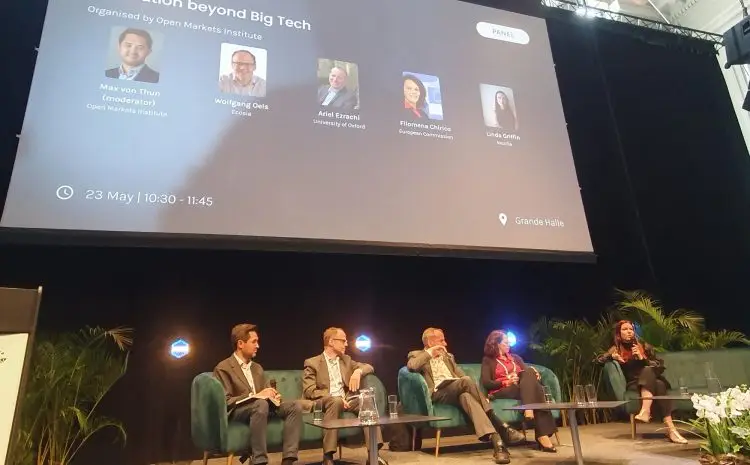Can Europe regulate its way to a competitive tech market?

Innovation beyond big tech
Europe is implementing at raft of digital regulations, including the Digital Services Act package, the AI Act, the Data Act and more on the horizon including a proposed Digital Fairness Act. Many will question how so much regulation aligns with Europe’s drive to create digital champions – but according to speakers at CPDP, regulation can be a means of enabling innovation to flourish.
“Good regulation encourages good innovation,” said Filomena Chirico, Head of Unit – Digital Markets – DG Connect, European Commission on the panel Innovation beyond Big Tech, moderated by Max von Thun of Open Markets Institute.
“Regulation orients and creates incentives. You create space for innovation by regulating.”
The Digital Markets Act (DMA) is intended to create contestable digital markets.
“The DMA is a bit of a vibe,” said Linda Griffin, VP, Global Policy at Mozilla. “We’ve got the UK, Japan, Australia and Brazil looking at similar ways to get ahead.”
Mozilla owns the Firefox browser and the Gecko engine that powers it, offering high standards of privacy and security.
“We have a really good news story from the DMA. After one year of the DMA, we’ve seen an increase in usage of Firefox. Competition policy enforcement is helping us set a level playing field.”
But there is still a lot that needs to be done, Griffin said. “We need more interoperability; we need less bundling of services.”
Ariel Ezrachi, Slaughter & May Professor of Competition Law, University of Oxford: “It’s not competition policy that is hindering innovation in Europe. The problem is lack of funding, capital markets, human resources – we just have an environment that is problematic. We need to reduce the regulatory burden, but not the DMA. We need to move to smart regulation, so downstream players have access to opportunities.”
“It’s about sovereignty,” said Wolfgang Oels, COO at Ecosia. “As Europeans we are blackmailable; they can stop access to our emails. 25 million public workers in Europe every day train foreign hostile algorithms, and that has got to stop!”
Speaking on an earlier panel on innovation and privacy, Uljan Sharka, CEO of igenius said: “Imagine if everyone in the world was using centralised AI models; the companies that own them would own the world’s IP.
“Europe should build the brand of trust around AI.”
“We have a problem in Europe; everyone wants to copy the US. It’s not going to work as we have a different culture. Building in Europe is hard work! We have leadership in other industries, we just have to admit we don’t have leadership in this industry.
His AI company, igenius, competes on the global stage though increased computing power. “We built a LLM that is number six in the world, because we got access to more compute. The future of European AI depends on compute; it doesn’t depend on data.
“We need to turn this tech into a fundamental human right. If we compare it to the printing press revolution, democracy will depend on it.”
Ignasi Belda, of the Spanish AI supervisory agency (AESIA) said: “We are in a revolution compared to industrial revolution 200 years ago. We are going to see AI everywhere, in all industries and all fields of society. We have to be aware and learn from history – we can’t afford to leave anyone behind. The good news is we have the AI Act in place; this good instrument is going to help government, industries and society in general.”
More from CPDP2025:




